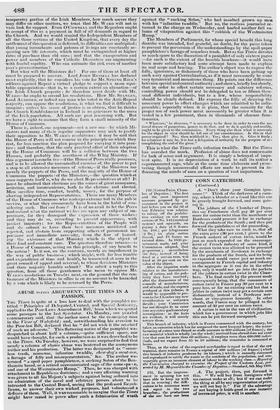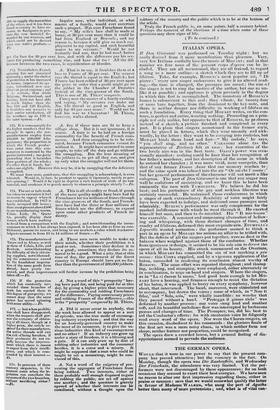170.[CottonTwist. Cham- ber of Deputies.] The first and the most
important measure proposed by go- vernment in the project it laid before you on the ad of last February was relative to taking off the prohibi- tion existing on raw spun cottons of No. 143 (metrical system) and upwards, on paying a duty of 8 francs [is. 10d.] per kilogramme 12 lbs.] on plain cotton thread, and 10 francs on twisted ditto. In 1833 go• vernment made, and your Commission adopted, that proposition ; nevertheless the duty, instead of being fixed at a certain sum, was fixed at 30 per cent on the value of the object. After the inquiries made relative to the manufactur- ing of cotton, and the pub- licity they have received ; after the discussions of the councils of manufacturers, and of trade, and the exposes produced at this tribune, it would be impossible to pre- sent to the Chamber any new consideration or unknown derails ; your Commission has not thought fit to enter into any extra-parliamentary investigation: as the facts are evident, it will merely retrace them. A. "Don't show your Georgian igno- rance!" Think of the darkness of a coun- try, where a blunder or a fraud like this can be gravely brought forward, and none gain- say it.
The jobbers of the Chamber of Depu- ties say Frenchmen shall pay 30 per cent more for cotton twist than the merchants of Bordeaux could procure it for in exchange for the products of the South ; and then put forward the gainfulness of the proceeding.
What they take care to emit is, that all the extra price (30 per cent.) given to the French makers of cotton twist, would be just as much expended on the encourage- ment of French industry of some kind, if the cotton twist was allowed to be procured by the merchants of Bordeaux in exchange for the products of the South, and its being so expended would cause just as much en- couragement to French capital and industry in the aggregate as it can do in the other way, only it would not go into the pockets of the jobbers in cotton twist in the Cham- bers. The final result by the present mode consequently being, that the consumers of cotton twist in France pay 30 per cent to a pure loss, or for no existing end but that a jobber in cotton twist may get a certain sum dishonestly, instead of a Bordeaux mer- chant or vine-grower honestly. In other words, that France may be pillaged to the amount of 30 per cent on cotton twist. A nation is not in the van of civilization, which has a government in which jobs like this can be put forward unexposed.
This branch of industry, which in France commenced with the century, has taken an extension which has far surpassed the most buoyant hopes; the manu- facturing of cotton into thread or stuffs amounts to 600 millions [of francs]; the raw material which is wholly [on the whole] received from abroad does not enter into that sum for more than 60 millions ; it employs more than 600,000 indivi- duals, and we export from 55 to 58 millions; the remainder is consumed at home. Thus, as the value of the exported merchandise is equal to that of the raw material, there remains in Fiance a capital of 500 millions [of francs] (which this branch of industry produces by its labours,) which is annually consumed and reproduced to satisfy the wants or the comforts of the population, and con- sequently gives an immense element of labour to the working class. —Report of the Commission charged to examine the Prefect of the Customs Law, pre- sented by M. Meynard to the Chamber of Deputies.—Standard, 8th May1834.
171. But the improve- A. The project, then, put forward is meat in spinning has not this. " We will buy from foreigners what Liven able to keep up with we cannot make at nil; but if we can make that in weaving ; the diffi- the thing at all by any augmentation of price, cultieri t6 be overcotne were 'we will not buy it." For if the advantage not equal in the two not buying it holds good in one instance able to supply the necessities of the other, and it has been found necessary to have re- course to foreigners to pro- cure the raw material de. mantled by our weavers, and which could not be derived from our native produce.— 172. Nevertheless, French spinning has not remained stationary.; under the shelter of protection it has increased its looms, improved its sys reins, introduced new ma- ehines at great expense; and it is certain, that while Belgium, Switzerland, and Saxony, have not been able to reach higher than the has. I 10 and 120 Euglish, it furnishes our weavers to their entire satisfaction, all the numbers up to 170 in the same system.—Ib.
173. It is consequently for the higher numbers that the struggle is open ; the net- manufacturers employ from 180,000 to 200,000 kilo- grammes; the proportion in Which the French produc. tions enter into this con- sumption is contested by the parties interested ; one party pretending that it furnishes three quarters of the whole; tte other that it barely fur- nishes one-eighth. However this may be, it is by smuggling that the deficiency is supplied. A. That is to say, it furnishes them at a loss to France of 30 per cent. The weaver says the thread is equal to the English; but France has been robbed of 30 per cent upon the price in order that a profit might go to the jobber in the Chamber of Deputies instead of the vine-grower of the South. This is one of M. 'niers' 'conquests. Fancy now the master of a family exulting and saying, " My servants can make me No. 170 thread as good as English, and only for 30 per cent more." Would not he find his way to Charenton ? M. Thiers, however, walks abroad.
A. See if these men are fit to keep a village shop. But it is not ignorance, it is worse. A duty is to be laid on a foreign commodity for the benefit of French com- merce. And then smuggling is to be tole- rated, because French commerce cannot do without it. It might have occnrred to some people, to take off the duty and go without the smuggling. But the true meaning of the jobbers is, to get all they can, and give up only what the smuggler will not let them.
We must here state, gentlemen, that this smuggling is acknowledged, is even tolerated. Would it, in fact, be prudent to oppose it rigorously, merely to pro- tect spinning ? Would it be right to deprive a rich branch of trade of its raw material, and condemn it to perish merely to observe a principle strictly ?—lb.
A. This is all absurdity or fraud, if goods of the same quality might have been had by Frenchmen for ten millions of francs through the vine-growers of the South, and French- men have had the three or four millions of francs which are the difference, to expend upon some other products of French in- dustry.
A. These men seem unable to make up their minds, whether their prohibition is a good or not. Sometimes they declare it to he a good ; sometimes they declare its re- moval to be a good. What a pity, that at this time of day, the government of the finest country in Europe should have got no far- ther than the government of 200,000 jobbers.
176. If the protection which has constantly sur- rounded these branches of trade has carried them to this degiee of prosperity, we cannot deny that the same power has served spinning with some utility.—Ib.
177. — but when prohibi- tion shall have disappeared, when the weavers shall pos- sess the certainty of obtain- ing at all times, though at a higher price, the article re- iNired for their manufacture, the native threads will run the risk of being forsaken, if their producers do not ra- pidly increase the improve- ment which there is reason to expect from their intelli- gence, and which is com- manded by their interest.— lb.
178. In presence of these contrary exigencies, is the moment come when the le- gislation can conciliate the interests of the two branches, without sacrificing either ? —lb. A. Not a word of this "prosperity" hav- ing been paid for, and being paid for at this day, by giving a higher price than necessary for the commodity amid robbing Frenchmen of the difference. Paying unnecessary prices and robbing France of the difference,—this is the " prosperity " conquered by M. Thiers.
A. Did it never occur to anybody, that the work here allowed to appear as a sort of episode, was the true mode of encourag- ing industry everywhere ;_ and that the way for an honestly-governed country to make the most of its resources, is to give the va- rious industries this kind of encouragement and no other? If an industry can grow up under a state of freedom, it is a blessing and a gain. If it can only grow up by dint of robbing other industries and the consumer besides, it is a curse and a misery. It might be supposed that a man who could be taught to set a mousetrap, might be con- vinced of this.
A. Not a word of the exigency of pre- venting the aggregate of Frenchmen from being robbed. Two interests, either of them probably well enough disposed to gain by robbing the public, are set off against one another ; and the question is gravely opened of whether their interests can be conciliated, without a thought upon the robbery of the country and the public which is to be at the bottom of the whole.
Truly the French public is, on some points; half a century behind. Perhaps the moment of the elections is it time when some of these questions may show signs of life.
(To be continued.)





















 Previous page
Previous page